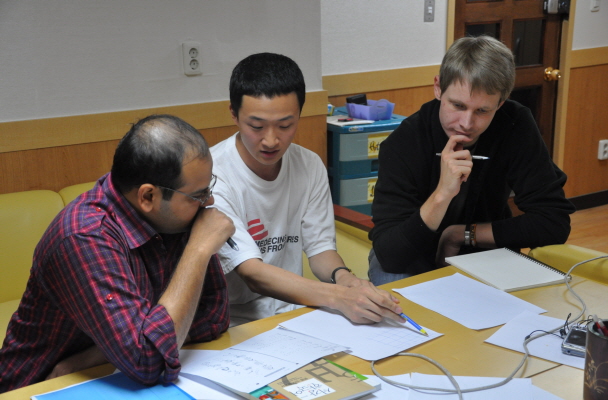
This past 9th was Hangul Proclamation Day, or simply just Hangul Day, a Korean national commemorative day marking the 1443 invention and 1446 proclamation of the Hangul alphabet by King Sejong the Great. As English is becoming the global language, more Korean students are struggling with a Korean-English dictionary and watching American TV shows to learn English. However, there is a group of students trying to learn Korean.
In Dormitory 16, better known as DICE (Dormitory for International Cultural Exchange), there reside many foreign exchange students. As its name explains, Korean students also live in DICE for international cultured exchange. Even though they are not so familiar with the language, the foreign students are very eager to learn Korean.
To accommodate their desire to learn, DICE currently offers two one-hour classes on Tuesdays every week. At 10 PM are the beginner and intermediate Korean classes. Each is led by a student leader with a passion for teaching Korean to the foreign students. Any foreign student can come to learn Korean without any commitment, and any Korean student can come and help teach Korean.
For beginners, the leader teaches the pronunciations and meanings of useful daily Korean expressions. There are enough Korean speaking volunteers to help the foreign students one by one. They also teach the Korean alphabet and how to read Korean characters. The students that are able to read Korean belong in the intermediate class. The leader selects a different cultural theme every week such as traditional food, and teaches Korean words and expressions related to the theme.
Indeed there are more systematic and professional institutions where students can learn Korean, but there are reasons why the DICE program is so popular among the foreign students. Korean students get to know the foreign students better and participate in the required DICE programs. On the other hand, the foreign students are able to learn only the practical expressions from the students that they actually need every day. In addition, they each get to practice with a native speaker to help them fix their pronunciation. An exchange student from Austria, Manuel, likes this group study because he “can ask questions in English and practice the pronunciation.”
Besides the learning, both groups of students get to build a friendship that transcends the language barrier through this experience. Some advanced foreign students are able to read the menu and order drinks in the Log House themselves.


